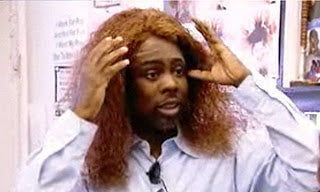A Brief Hair-story (By Audrey Annoh-Antwi)

Chris Rock tries on a lace front weave for his documentary Good Hair (2009)
My eyes are often surprised by what they encounter on daily commutes. As I become conscious of my surroundings my eyes start to probe my temporary companionsgetting on and off the train. I admire the well groomed, the immaculate and the stylish in equal measure. However when my gaze rests upon women of a similar skin tone to my own I am drawn to something odd atop most of their heads. This common place oddity is the shiny, straight, flowing hair that is not indigenous to people of African/ Afro Caribbean descent. Weave, lace front wigs,extensions and chemically straightened hair have remained the most popular waysfor black women to style their hair. As a black woman who has worn a natural afro for more than a year I am bewildered by the prevalence and preference for artifice. Hair is a biological fact, the texture of which is pre destined by ethnic heritage. However hair is often loaded with a greater significance for women due to the emphasis on a desirable external appearance. My mother has often uttered thewords “a woman’s hair is her beauty”. One thing that has been apparent to me from a young age is that some hair is sold as being more beautiful than others. This so called beautiful hair for most part looks nothing at all like whatgrows out of my scalp. American documentaries like Chris Rock’s Sundance hit, Good Hair and the lesser well known My Nappy Roots: A journey Through BlackHair-itage by Regina Kimbell have made black woman’s complex relationship with their hair a focal point. The conflicts are highlighted as mainly being rooted in America’s history of slavery. Good hair has European characteristics and bad hair is ‘nappy, picky’ and a whole host of other negative adjectives. Listening to the various stories of black British women and their relationship with their hair there was more positive and less political connotations of natural hair and that good hair means ‘healthy and presentable looking’ regardless of texture . But I did find the overall consensus was that straight hair ‘looks nicer and is more manageable’. The so called manageability can come at quite anexpense to the pocket and hair health. The manageability of chemically straightened hair is to some extents a myth. Chemically straightened hairs’ favourite sustenance is money and time. One friend said that “it needs a conditioning treatment every six weeks costing £50 as well as retouching of coarse natural roots every two months at £60.” For alot of young women who favour chemically straightened hair, the expense is not manageable and the consequences associated with poor upkeep can be dire, “once chemicals touch the hair it is a done deal, I will have to cut off the damaged hair and start again”. Braided hair extensions and sewn on weaves do not fare much better having been linked to hair loss and receding hair lines. Unfortunately many women are willing to live with the consequences of following the fashion of long, straight textured hair. The lack of visibility of natural hair textures is an issue. I was asked ‘How many successful black women in the public eye have hair that contains no artificial additions or chemical manipulation?’ Much to my horror the singer/actress Grace Jones and a snippet of a young Diane Abbott (Labour politician) from the 90’s before she was heavily featured on television came to mind and now even she wears her hair straight. I had honestly never thought about the lack of hair like mine in popular media and what this disparity could mean. Slowly but surely change is unfolding before my eyes. As I walk through the streets of London I see black women sporting beautiful dreadlocks, shaved heads and interesting afro styles. I even saw a short news report by the BBC title‘Natural hair revival for black women’ where going natural was touted as being the new fashion. All this fuss about something that happens to grow on yourhead. I would just be pleased if the day comes when hair is just a fact. What are your thoughts?
Comments
0 Comments